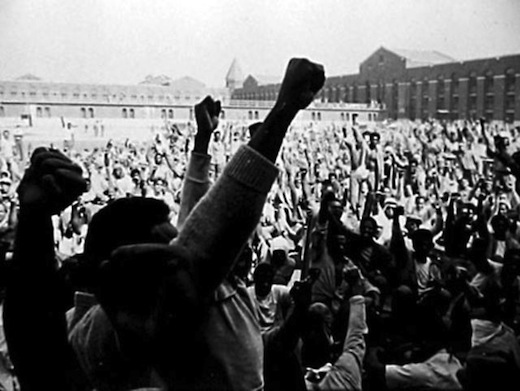
Today in labor history in 1971, 11 AFSCME-represented prison employees and 33 inmates died after an uprising at Attica Correctional Facility in New York State and its subsequent bloody end with 1,000 police and national guard troops seizing the prison.
Website Talking History says:
“Five days earlier, thirteen hundred prisoners had rebelled, taken over the prison, and held forty guards hostage. Issuing a list of demands-including calls for improvements in living conditions as well as educational and training opportunities-they entered into negotiations with state officials. The negotiations failed and the troops seized the prison; in the course of taking it over they killed forty-three individuals, including ten hostages.”
Then-Governor Nelson Rockefeller said the prisoners had killed the hostages, which proved to be false. (Inmates were found to have killed one guard and three fellow inmates during the uprising.)
Tapes of conversations between Rockefeller and President Richard Nixon revealed a behind the scenes look at those infamous days.
The New York Times reported:
“‘Nixon’s strategy for dealing with the Attica massacre was to minimize press coverage, to spin the story in favor of the government, and to assail members of the press,’ said Theresa C. Lynch, an adjunct professor of history at the University of New Hampshire at Manchester who is writing a book about Attica and discovered the tapes at the National Archives in Washington. ‘I think the tapes reveal that.
‘He also began a campaign to convince the American public that Rockefeller had acted correctly in not going to Attica to quell the uprising and in retaking the prison by storm. This campaign was based on racism and lack of concern and callous disregard for the lives of prisoners.'” The majority of prisoners were Black and the guards/hostages were white.
The riot caused the nation to take a closer look at prison conditions, for inmates and guards alike.
Today, in the United States, more than 2.25 million adults are incarcerated, a number that has risen dramatically since the 1980s with the “war on drugs” and mandatory sentencing. The implications of the largest prison population in the world, including helping to create a new racially-segregated Jim Crow society, has prompted calls to end the war on drugs and focus on a more rehabilitative strategy for addicts and offenders.
Robert Rooks, criminal justice director for the NAACP, has said statistics show that the war on drugs has failed, that drug use and addiction rates have not decreased.
“The only thing we’ve accomplished is becoming the world’s largest incarcerator, sending people with mental health and addiction issues to prison, and creating a system of racial disparities that rivals Jim Crow policies of the 1960s,” Rooks said.
At the same time, prisoner rights groups and AFSCME have been opposing a new feature: the take over of prisons by private, for-profit businesses.
Photo: Inmates take over Attica prison in 1971. (CC)

MOST POPULAR TODAY

High Court essentially bans demonstrations, freedom of assembly in Deep South

Zionist organizations leading campaign to stop ceasefire resolutions in D.C. area

U.S. imperialism’s ‘ironclad’ support for Israel increases fascist danger at home


UN warns that Israel is still blocking humanitarian aid to Gaza






Comments